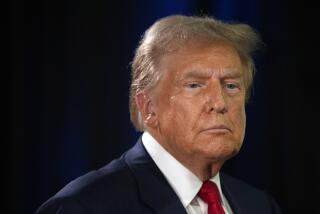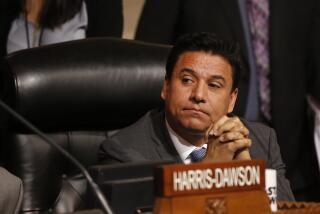Questions Clarity of Statute : Judge Refuses to Dismiss Any of 4 Nofziger Counts
- Share via
WASHINGTON — A federal judge Thursday refused to throw out any of four illegal-lobbying counts against former White House aide Lyn Nofziger, but he took a swipe at the enforceability of the federal ethics law under which Nofziger is being tried.
“The big problem in this case,” U.S. District Judge Thomas A. Flannery told lawyers on both sides, “is that we’re dealing with a statute that is hardly the model of clarity.”
While Flannery denied motions for directed verdicts of acquittal, he said that the case completed by the prosecution Tuesday is “weaker on some counts than others,” and he invited the defense to renew the motions before the matter goes to the jury, proably sometime next week.
At a hearing Wednesday, Flannery had expressed strong skepticism about a charge that Nofziger illegally lobbied then-presidential counselor Edwin Meese III on a $32-million Army contract sought by scandal-ridden Wedtech Corp. in 1982. Nofziger also faces three other counts, involving lobbying for Wedtech and an aircraft firm and a labor union.
Undercut Testimony
The first witnesses called by the defense Thursday focused on the first Wedtech charge. They undercut previous testimony that Nofziger had been working on the Wedtech contract while he was still President Reagan’s political director and that the contract was a major concern of the White House when Nofziger, as a private lobbyist, contacted Meese.
Nofziger violated the law only if the Wedtech matter was of “direct and substantial interest” to the White House at the time he lobbied his ex-colleague.
Paul Russo testified that he was unaware of any discussions about the Wedtech contract while he was serving as a top aide in Nofziger’s White House office in 1981.
Moreover, Russo and Michelle Davis, another aide in the office, contradicted testimony last week that Pier Talenti, a $1-a-year volunteer in the office, had been actively helping Wedtech pursue the no-bid contract to build small engines for the Army in the South Bronx.
‘Vague Memory’
Russo, the office’s Northeast coordinator, said that he had only “a very vague memory of (Talenti) doing speech writing and maybe a direct mail piece.”
Russo said he had never seen a 1981 memo in which Nofziger recommended to another White House official, Elizabeth Hanford Dole, that Talenti work with her office on “the South Bronx idea.”
Flannery, in an exchange with independent counsel James C. McKay Wednesday, attacked the prosecution’s reliance on testimony about Talenti that was given by a convicted former Wedtech official, Mario E. Moreno.
Calling the testimony “hearsay . . . pretty thin,” he dismissed Talenti as a “dollar-a-year man.”
“Some of our most eminent people are dollar-a-year men,” McKay responded.
“Was he an eminent dollar-a-year man?” Flannery shot back. “Why didn’t you call him” as a witness?
McKay said he did not think it was necessary.
Former White House aide Rich Williamson also testified for the defense Thursday, saying there was nothing unusual about Wedtech President John Mariotta being invited to a White House meeting with Reagan Jan. 21, 1982, nine months before his firm won the contract over Army objections.
1,200 ‘Outsiders’
More than 1,200 “outsiders” had met with Reagan in the previous 12 months, Williamson said.
Mariotta was the only businessman present in a group of mostly state and city officials who were gathered to support Reagan’s proposal to establish job-creating “enterprise zones” in such blighted areas as the South Bronx.
Although most outsiders find it “intimidating” to speak at such meetings with the President, Williamson said, Mariotta and Chicago’s then-Mayor Jane M. Byrne gave “impassioned” speeches.
Williamson said he could not recall if Mariotta mentioned the contract he sought.






